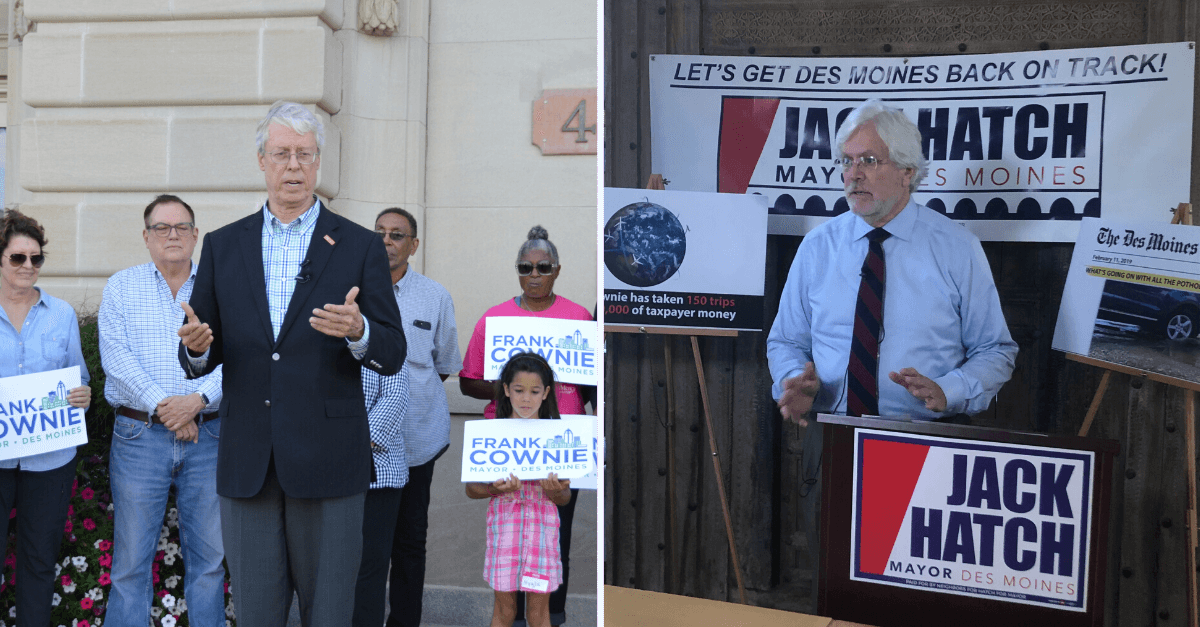
An expensive, surprisingly close run-off election for the Des Moines mayoral seat comes to a close tomorrow. The final weeks have featured attacks and counter-attacks as both candidates have criticized each others’ records and backgrounds. Voters have been inundated with TV ads, online videos, text messages, calls and mailers for Iowa’s largest city’s top job, in the midst of all the other caucus campaigning.
Mayor Frank Cownie, already the longest-serving mayor in Des Moines history, just barely edged out former state senator and housing developer Jack Hatch in the November 5 election. Cownie received 43.4% of the vote that day in a four-way race, compared to Hatch’s 42.7%.
Typically, Cownie has won by large margins against nominal or no opposition since his first election to the seat in 2003. But Hatch, who entered the race just before the filing deadline, quickly invested a large sum of his own money into his campaign.
More financial information should come out later today, but the campaign finance report before the November election showed Hatch giving his campaign a $75,000 loan, while raising another $32,598 by October 31. Cownie ramped up his fundraising after Hatch’s entrance, bringing in $137,175, also by the end of October.
[inline-ad id=”0″]
That fundraising side has clearly not slowed down for the run-off, as both campaigns have spent heavily on advertising. In the final week, Hatch is running $17,725 worth of ads on KCCI alone, while Cownie has $15,950 in advertising on the station.
The content of those ads have been a big source of controversy. Cownie rolled out an ad questioning Hatch’s past developer fees and votes he took on tax credits.
Hatch responded with an ad with a more humorous tone that took aim at trips that Cownie has taken while mayor.
The Cownie campaign’s ad generated significant pushback from Hatch, who petitioned the local TV stations to have it taken down, calling it a “flat-out lie.” He took issue with the notion that he had improperly benefited from developers fees or had any conflict of interest with his votes.
“I have been audited every year for my projects, and the complaint that I make a developer’s fee follows everything,” Hatch told Starting Line in an interview. “It takes me anywhere between $75,000 and $150,000 just to get the project to get financed. So the money I get is reinvested back in the company. It goes into the salaries of my employees. It goes into the overhead.”
[inline-ad id=”1″]
Hatch noted that some of the developer fees do go to his paycheck, but that a Register report found “there was no conflict of interest, that I actually followed the rules of any other developers.”
The Cownie campaign stood by their claims.
“We stand by our ad because Des Moines voters deserve to know how millionaire developer Jack Hatch has used our tax dollars to build his company,” Cownie’s campaign told Starting Line. “If Sen. Hatch thinks the Des Moines Register got the information wrong about his $81 million in tax subsidies, or his $7.1 million in taxpayer-funded developer fees, then he should file his complaint with The Register.”
A Register editorial did weigh in on part of the ad’s content today in their endorsement of Hatch again for the run-off.
“[A]n ad stating Hatch collected more than $7 million in developer fees while working on Iowa projects cites the Des Moines Register as its source, but does not mention the newspaper’s investigation found the fees were in line with what other developers charged,” the Register’s editorial board wrote.
Outside of the ads, both candidates have kept plenty busy in the last days of campaigning.
“Mayor Cownie has spent the days leading up to the election talking to voters,” Cownie’s campaign said. “On Wednesday, he worked at the charity event Festival of Trees and attended a block party at Creative Visions. On Thursday, he packaged meals for the homeless with Gobble Gobble Des Moines. On Friday, he drove around with his two granddaughters, delivering yard signs. On Saturday, he is attending a few events and walked around the East Village to meet shoppers during Small Business Saturday. All the while, he has been making phone calls and texting supporters.”
[inline-ad id=”2″]
The texting of voters has been an addition to municipal campaigning this year. Both campaigns have used the Hustle app that Democratic operatives developed in recent years that allows campaigns to easily text voters messages in quick succession.
The other important measure to watch is the ground game. In any local race, especially a run-off, whichever side can better drive turnout has the advantage. There will be two other city council run-offs underneath the mayor’s race: the Linda Westergaard and Skip Moore race for Ward 2 and Jacquie Easley and Carl Voss’ race for the at-large seat.
Early voting with absentee ballots are central to that.
Hatch felt his team had improved on that front since the initial election.
“There are about 2,200 ballots in as of [the] Friday [before last],” Hatch said on Wednesday. “We generated almost 850 of them, which is substantial. So, the ground game on our side is substantially better than it was in the general election.”
The Polk County Auditor’s office provided Starting Line late this morning of the latest early vote numbers broken down by city ward. Overall, 2,726 ballots had been requested and 1,837 were returned. These are the returned by ward:
Ward 1 – 244
Ward 2 – 487
Ward 3 – 680
Ward 4 – 426
Cownie’s strongest showing in the November 5 election was in Ward 3, which takes in part of the South Side. The ward-specific run-off race is in Ward 2.
For their closing message, Cownie’s team said they would continue to focus on the Mayor’s effort to launch the largest street repair in city history, cut the city’s tax levy and invest $145 million for sewer upgrades and flood mitigation efforts in city neighborhoods.
Hatch highlighted how he felt his messaging has helped shape the debate in the race.
“When we knew we were putting together an issue-oriented campaign, we talked about the water first,” Hatch said. “All of the sudden, [Cownie’s] talking about it. We said, you know, your property taxes are too high. He said, oh, he lowered property taxes … We started talking about mental health services in schools, and he started talking about it. So, we’ve set the agenda because we know what the people are talking about.”
Voters can continue to visit the downtown election office today to cast their ballot. Tomorrow, it’s back to the regular polling sites to decide who will be the next mayor of Des Moines.
by Pat Rynard
Posted 12/2/19
Politics

6 terrifying things that could happen if the Comstock Act is used to target abortion
Does 1873 sound like a really, really long time ago? Well, that’s because it is—but if Republicans and far-right anti-abortion activists have their...

Iowa parents explain how ‘fetal personhood’ would harm IVF
Lyndi Buckingham-Schutt and her husband Andy Schutt, both Des Moines residents, always knew they wanted to have children. When Lyndi was 30, they...
Local News

No more Kum & Go? New owner Maverik of Utah retiring famous brand
Will Kum & Go have come and gone by next year? One new report claims that's the plan by the store's new owners. The Iowa-based convenience store...

Here’s a recap of the biggest headlines Iowa celebs made In 2023
For these famous Iowans, 2023 was a year of controversy, career highlights, and full-circle moments. Here’s how 2023 went for the following Iowans:...





